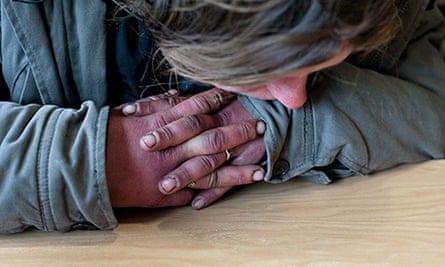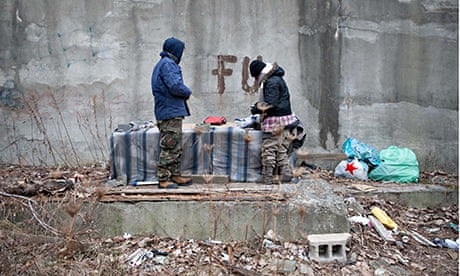On a recent Sunday morning I drove two homeless heroin addicts, Eric and Sonya, out of New York City. In doing so, I might have broken a law. It's possible that Eric had a violation of probation charge. He talked about it, but Eric talks about a lot that isn't true.
I had met Eric and Sonya two years earlier, when their home was an abandoned building in the Hunts Point section of the Bronx, New York City's poorest area. She was a former "soccer mom" who started using heroin eight years prior. That first prick of her skin collapsed her life and they have been homeless since, falling into a habit that costs around $200 a day. They mostly beg for the money, but sometimes they find, raise and sell stray kittens on Manhattan street corners.
When I first started my project documenting the homeless addicts of the South Bronx, before meeting Eric and Sonya, I found myself falling into the trap of trying to force positive outcomes. Out of frustration and a sense of helplessness, I ended up trying to "save people".
I was encouraged by daily emails and messages, from people who viewed my photography work with addicts, saying:
Please help them get clean. Everyone deserves better than a life devoted to drugs.
It never went well. When another addict, Shelly, was released from detox at 7am on a Saturday morning, with no place to go, I picked her up, and at her request, tried to help her stay clean from drugs until Monday morning, when she could enter a 28-day rehab.
That weekend I locked the doors of an apartment to keep her from ending the pains of her withdrawal with a needle. We both eventually caved. By Sunday evening, I was scouting for methadone from the streets to salve her pain, but she ran back to Hunts Point for cheaper illegal drugs. I returned to an empty apartment realizing I had locked that door to provide me with a positive story as much as to help Shelly.
I saw "saving someone" for what it is: an arrogant presumption that you know what is best for others. The only person one can save is oneself.
Eventually, I realized the best you can do is stand by and listen in a non-judgmental fashion, making yourself available should people decide they want help.
On a recent Sunday, I drove Eric and Sonya out of New York City because they asked me to. They had gotten relatively clean, finishing seven days of detox, and in their minds had a place to go where Eric could get a job.
A year ago Eric was arrested for a direct sale he claimed he didn't do. He spent the next six months in jail, on Rikers Island. He was released after five months, given probation, two yellow papers listing the things he had to accomplish or he would be returned to jail. He was provided with no resources, just a token for one subway ride.
For much of the following months, Eric and Sonya continued to use drugs, continued to live without a home, and continued to beg for money. All, as I understood, violations of his terms of release, although I don't know the specifics. They also continually sought to find a path to a drug-free life. Sometimes it meant attempts at detox, sometimes it meant talk of moving. It always took place against a backdrop of heroin entering their arms.
One possible solution slowly emerged, cobbled together over time. Eric had gotten a copy of the Industrial Trade Report (a monthly listings of non union construction jobs), he had gotten steel-toed boots (necessary in his mind for construction jobs), he had put together his resume, and he had a list of numbers of people hiring welders.
They decided on a new place they thought would be better for them. In this new place Eric would stay clean, pass the welders' test, get a job, and then use the money and structure to get Sonya clean. She wouldn't have to panhandle anymore. Realistically, it probably won't happen. It's probably a fantasy, but that doesn't matter. To Eric and Sonya, it isn't a fantasy.
More importantly, it meant leaving Hunts Point, a place that was doing them no good. A place where they now lived in a pit, a place where Sonya was rapidly losing her health, a place where Eric could never get a job, a place where neither was going to ever get clean. A place the police could arrest them for any of those things.
I drove Eric and Sonya out of Hunts Point because they were now my friends and they asked for a favor. That favor might have been breaking a law. That is what comes with being close to homeless addicts. Unlike "functional addicts" their lives are constantly under a police microscope and almost anything and everything they do could be considered breaking a law.
Families of addicts know this all too well. Parents, brothers and sisters, are constantly pressured and tasked, emotionally and physically, to do things against their interest, against their better judgment, to put themselves in unnecessarily dangerous situations. Addicts can be damn selfish.
A former heroin addict who saw my work once commented to me:
When I was a dope addict, plenty of people offered to buy me lunch, nobody bothered to talk to me, to give a shit about me.
You can't save somebody, but you can give a shit about them.
Giving a shit about an addict means sometimes doing things for them that don't sound rational to you.

It means feeling a tiny tiny bit of the crap they deal with on a daily basis.
